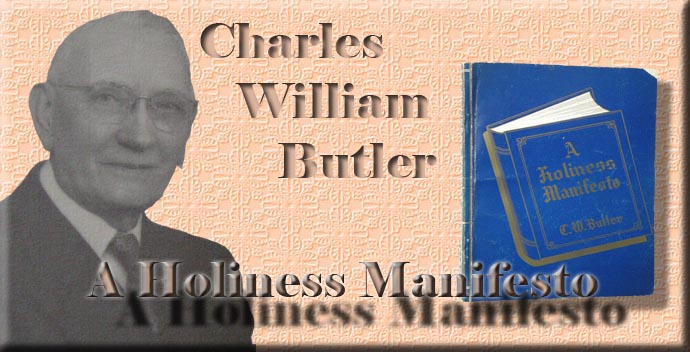
A Holiness Manifesto
By Charles William Butler
Introduction
|
The Communist Manifesto was issued by Karl Marx and Frederick Engels in 1847. The far-reaching influence of this work is now manifest in that more than one-third of the earth's population has been brought under the sway of the Communist regime. A manifesto of far greater influence and significance, than the Communist Manifesto, is proclaimed by the Apostle Paul in these words: "According as he hath chosen us in him before the foundation of the world, that we should be holy and without blame before him in love" (Eph. 1:4). The holiness manifesto, patterned according to God's choice and plan, is the supreme manifesto of the ages. This manifesto extends from the eternity of the past to the eternity of the future, and presents the only complete remedy for the malady of sin in all of its phases, the overwhelming blight and curse of mankind. One of the best equipped men of our generation, to present the Scriptural manifesto on "true holiness," is Dr. C. W. Butler. He speaks out of a wide experience as pastor, teacher, college president, author, editor, and evangelist. His keen, penetrating insight, profound spiritual discernment, and wise discrimination in terminology, have contributed to a manifesto on holiness of the first rank. This volume presents holiness as a doctrine of Scripture; holiness as an experience and holiness as a life. The instant crisis involved in obtaining the experience of holiness is not a final but a door of entry to an experience where much territory is to be explored and many conquests are to be made. The relation of the new birth to holiness is portrayed with clear and illuminating insight. The timely illustrations in this volume are adequate windows through which floods of light enter for further illumination of the subject. The theories of eradication, suppression, or counteraction are discussed in regard to their relative merits on a scriptural basis. The author says: "It is not a sin to be human. To associate mortality and sin as inseparable is to charge God foolishly as being the author of sin. God created mortal man, but God did not create sin." The steps necessary to obtain and maintain the experience of holiness are clearly defined. In the chapters of this book will be found a treasure house of truth pertaining to "the breadth, and length, and depth, and height" of the experience of holiness, obtainable in this life through the shed blood of Christ, which cleanses from all sin. The full and complete atonement of Christ for all sin does not leave the human heart a necessary hiding place for the remains of carnality. Christ is not limited in his power to save from all sin. He is able to do for the Christian "exceeding abundantly above all that we ask or think, according to the power that worketh in us." J. C. McPheeters |
|
 |
 |
|
|
|
-
Site Navigation
 Home
Home What's New
What's New Bible
Bible Photos
Photos Hiking
Hiking E-Books
E-Books Genealogy
Genealogy Profile
Free Plug-ins You May Need
Profile
Free Plug-ins You May Need
 Get Java
Get Java.png) Get Flash
Get Flash Get 7-Zip
Get 7-Zip Get Acrobat Reader
Get Acrobat Reader Get TheWORD
Get TheWORD